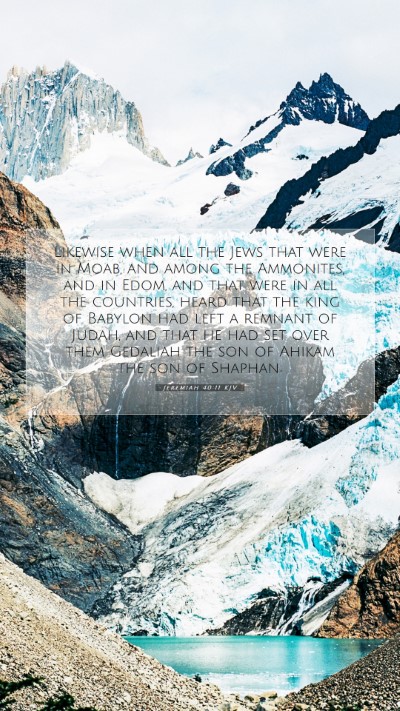Understanding Jeremiah 40:11: A Comprehensive Bible Verse Interpretation
Bible Verse: Jeremiah 40:11
“Likewise, when all the Jews that were in Moab, and among the Ammonites, and in Edom, and that were in all the countries, heard that the king of Babylon had left a remnant of Judah, and that he had set over them Gedaliah the son of Ahikam the son of Shaphan;”
Meaning of Jeremiah 40:11
Jeremiah 40:11 speaks of the aftermath of the Babylonian conquest, highlighting the fate of the Jewish exiles and the remnant left in Judah. This verse emphasizes the broader implications for the Jewish people scattered across neighboring nations, as they respond to the news about their homeland and its governance.
Contextual Analysis
Historical Context: The context of this verse situates itself within the period of the Babylonian exile. After Jerusalem's fall, many Jews fled to various nations, while others remained under Gedaliah's governance in Judah.
- Spiritual Resonance: This passage reflects a transitional period in Jewish history, a time of despair alongside hope as they absorb the changes brought by foreign dominion.
- Leadership Transition: Gedaliah’s appointment signifies a glimmer of hope for the remnants, suggesting a chance to rebuild their societal structure under his leadership.
Commentary Insights
This verse has been examined through various commentaries, each providing unique perspectives:
- Matthew Henry: He underscores the significance of God’s providence in preserving a remnant. Henry discusses the importance of Gedaliah's appointment as not just a political move, but a divine setup to foster faith and resilience.
- Albert Barnes: Barnes focuses on the geographical dispersion of the Jews, shedding light on their reactions. He stresses the communal aspect of returning and re-establishing identity in the face of adversity.
- Adam Clarke: Clarke notes the psychological aspect of the remnant’s situation, emphasizing how hope mingles with despair. His commentary reflects on the remnant's response to God’s mercy amidst their troubles.
Application of Scripture
The teachings in Jeremiah 40:11 can be applied to contemporary life in numerous ways:
- Resilience in Adversity: Like the remnant in Judea, individuals today may find themselves in situations requiring faith and perseverance.
- Community and Identity: The importance of communal bonds in times of uncertainty is evident, resonating with modern contexts where collective identity strengthens resolve.
Cross References
This verse relates to several other scripture passages, enriching its meaning and understanding:
- 2 Kings 25:24-26: This passage discusses the suggestion of gathering for solace and rebuilding after exile.
- Jeremiah 39:14: This verse refers to the sparing of the poor who were left behind, aligning with the themes of hope and restoration.
- Zechariah 8:8: This verse echoes God's promise to bring people back to their homeland, emphasizing restoration.
Conclusion
Jeremiah 40:11 serves as a critical juncture in biblical history, illustrating how God's plans encompass not just politics but also the emotional and spiritual renewal of His people. Through various commentaries, it's possible to grasp the profound implications this verse holds for both the Jewish people of ancient times and individuals seeking understanding today. These insights encourage ongoing exploration and interpretation through Bible study groups, providing resources for deeper engagement with Scripture.
In summary, the interpretations derived from multiple perspectives enable us to deepen our Bible study insights and expand our understanding of important biblical passages. The richness of Bible commentary and analysis can enhance our overall understanding of Scripture, paving the way for more meaningful applications in our daily lives.


